ALL’S FAIR IN LOVE AND WAR: Movie Reviews of Their Finest and Frantz by Howard Casner
Posted: April 24, 2017 | Author: Donald | Filed under: Uncategorized | Tags: Bill Nighy, Eddie Marsan, Ernst Stotzner, François Ozon, Frantz, Gaby Chiappe, Gemma Atherton, Jack Huston, Jeremy Irons, Lissa Evans, Lone Scherfig, Marie Gruber, Paula Beer, Philippe Piazzo, Pierre Niney, Rachel Sterling, Richard E. Grant, Sam Claflin, Their Finest | 648 Comments »For questions: hcasner@aol.com
First, a word from our sponsors: I am now offering a new service: so much emphasis has been given lately to the importance of the opening of your screenplay, I now offer coverage for the first twenty pages at the cost of $20.00. For those who don’t want to have full coverage on their screenplay at this time, but want to know how well their script is working with the opening pages, this is perfect for you. I’ll help you not lose the reader on page one.
Ever wonder what a reader for a contest or agency thinks when he reads your screenplay? Check out my new e-book published on Amazon: Rantings and Ravings of a Screenplay Reader, including my series of essays, What I Learned Reading for Contests This Year, and my film review
s of 2013. Only $2.99. http://ow.ly/xN31r
and check out my Script Consultation Services: http://ow.ly/HPxKE
Warning: SPOILERS
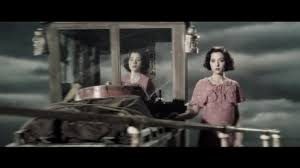 Their Finest is a movie about the making of a movie. But the creation of the film is done under rather extraordinary circumstances.
Their Finest is a movie about the making of a movie. But the creation of the film is done under rather extraordinary circumstances.
First, Hitler is raining bombs down on London during the blitz as the director is calling action.
Second, the film must be made to order and serve a certain propagandistic purpose.
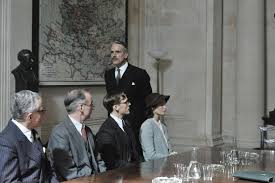 Their Finest, the title taken from a speech by Winston Churchill, opens at a British cinema with the audience watching a clunky and overly earnest film about working women giving their all to meet a war quota. Its intention inspirational, its result comedy unintentional.
Their Finest, the title taken from a speech by Winston Churchill, opens at a British cinema with the audience watching a clunky and overly earnest film about working women giving their all to meet a war quota. Its intention inspirational, its result comedy unintentional.
So the war ministry, headed with a marvelous cameo by Jeremy Irons as the minister, giving a rousing speech as if all involved are about to play rugby, wants a movie that is grounded in reality, but also has a message of hope (a seemingly contradictory request giving the dark days that have descended upon the empire).
Into this project steps one Catrin Cole (Gemma Atherton) who arrives thinking she’s applying for a secretarial position, but leaves as a screenwriter (well, someone has to write the women’s parts). She also leaves with a conflict: is her future to be a dutiful and supportive wife or an independent woman?
Since the movie is being made in 2017, the answer is fairly predictable.
Nevertheless, Their Finest is highly entertaining, never boring and ultimately moving. It’s a slickly made bit of stiff upper lip and the show must go on combined. I can’t see how anyone will be bored.
The most interesting aspect of the story, though, is not Catrin’s arc of mousy to independent, which is fairly standard, but how the movie manages to deal with the various slings and arrows thrown at the filmmakers and how they adapt and make due in trying to please all concerned, the funniest probably being a request from the Roosevelt administration that one of the central characters be an American (though Pearl Harbor has yet to happen). They select a flyer from the U.S. who has joined the RAF and who has become a popular hero. Unfortunately, though his credentials as a hero can hardly be challenged, no one bothered to find out whether his credentials as an actor were equally as good.
There are a couple of ironies here. The first is that the movie they make, The Nancy Starling, inspired by a story of two sisters, twins, who participated in D-Day, is only really surpassed by Their Finest due to technical superiority. In many ways, Their Finest, when all is said and done, may be aesthetically better than the movie within a movie the filmmakers make, but it’s little more than a movie grounded in realism that delivers a message of hope, something that the filmmakers in Their Finest tended to sneer at.
Second, though everyone cheers the idea that this breakout film is filled with working class heroes, the movie that really got everyone’s attention around the time in real life, Mrs. Miniver, is firmly focused on the upper class of the British caste system.
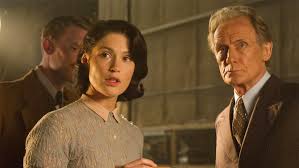 Still, as I said, the movie is highly enjoyable and it’s difficult to dislike anything that has Bill Nighy in it. And here he’s in top form as an aging actor who comes with a slice of ham, a prickly figure who has difficulty coming to terms with the idea that his days of being a matinee idol are over. He has a lovely moment at a gathering where he sings a sentimental song that can’t help but bring tears to the eyes.
Still, as I said, the movie is highly enjoyable and it’s difficult to dislike anything that has Bill Nighy in it. And here he’s in top form as an aging actor who comes with a slice of ham, a prickly figure who has difficulty coming to terms with the idea that his days of being a matinee idol are over. He has a lovely moment at a gathering where he sings a sentimental song that can’t help but bring tears to the eyes.
Also with Eddie Marsan as Nighy’s agent; Sam Claflin (Finnick Odair of The Hunger Games for those so inclined) as a fellow screenwriter and love interest; Jack Huston as Catrin’s cad of a boyfriend; Richard E. Grant as a producer; and Rachel Sterling (of The Detectorists) as a lesbian and assistant to the big bosses.
Gemma Atherton gives a strong performance as Catrin and she holds everything together rather well.
Directed by Lone Scherfig, who helmed the marvelous coming of age film, An Education, but has followed that up with solid, but uninspired fare like One Day. The screenplay is by Gaby Chiappe, one of Britain’s finer television writers, from the book Their Finest Hour and a Half, by Lissa Evans.
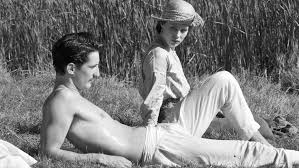 The title character in the new film Frantz is a young man who died in the trenches in World War One. His family is then visited by a Frenchman, Adrien, who claims to have been close friends with Frantz in Paris before the European conflict took place. The trio are at first reluctant to receive him, but as they get to know him, find solace in his memories.
The title character in the new film Frantz is a young man who died in the trenches in World War One. His family is then visited by a Frenchman, Adrien, who claims to have been close friends with Frantz in Paris before the European conflict took place. The trio are at first reluctant to receive him, but as they get to know him, find solace in his memories.
The direction is by Francois Ozon who wrote the screenplay with Philippe Piazzo. It’s inspired by an Ernst Lubitsch film, Broken Lullaby, which was in turn based on a play by Maurice Rostand, the son of Edmond Rostand, who wrote Cyrano de Bergerac.
But as it is in many Ozon films, nothing is quite what it seems and the story is driven by lies and deception, though often of the best intended kind.
Ozon may be a victim of the Hitchcock syndrome here. The master of suspense said he could never make Cinderella because everyone would expect there to be a dead body in the coach.
Ozon, in turn, has made many a film with gay central characters. So when Adrien claims to know Frantz, it seems as if he’s talking about in the Biblical way. It’s Ozon, what else could it mean?
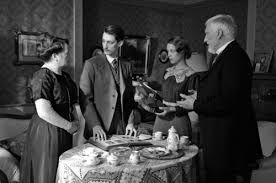 Well, something entirely different here and when the secret is revealed, it’s actually kind of a let down and a disappointment. The movie then takes some curious and not entirely uninteresting turns as it tries to decide if in life fantasy at times is more beneficial than truth. But it never really recovers from that central revelation.
Well, something entirely different here and when the secret is revealed, it’s actually kind of a let down and a disappointment. The movie then takes some curious and not entirely uninteresting turns as it tries to decide if in life fantasy at times is more beneficial than truth. But it never really recovers from that central revelation.
But I actually think there is a more serious problem and that is in the casting of Pierre Niney as Adrian. Actually, it’s not exactly the casting of the actor, but the casting of his mustache which, though popular at the time, is probably one of the more disastrous hirsute choices in film.
 For Niney, scrawny and large eyed as he is, the mustache makes him look like a young Salvador Dali, and is so distracting, it’s hard to take the character seriously. And then as time goes on, and Frantz’s fiancée Anna comes to look on him as a possible love interest, he has become something of a ninny such that rather than be unhappy when her love is not reciprocated, you feel as if she just dodged a bullet.
For Niney, scrawny and large eyed as he is, the mustache makes him look like a young Salvador Dali, and is so distracting, it’s hard to take the character seriously. And then as time goes on, and Frantz’s fiancée Anna comes to look on him as a possible love interest, he has become something of a ninny such that rather than be unhappy when her love is not reciprocated, you feel as if she just dodged a bullet.
With Paula Beer as Anna, Ernst Stotzner as Frantz’s father and Marie Gruber as his mother.
Movie Reviews of BIRTH OF THE LIVING DEAD, KILL YOUR DARLINGS and 15 YEARS AND ONE DAY by Howard Casner
Posted: October 24, 2013 | Author: Donald | Filed under: Uncategorized | Tags: 15 Years and One Day, Aron Piper, Austin Burn, Belen Lopez, Ben Foster, Birth of the Living Dead, Dane DeHaan, Daniel Radcliff, David Cross, Duane Jones, George A. Romero, Gracia Querejeta, Jack Huston, Jennifer Jason Leigh, John Cullum, John Krokidas, Kill Your Darlings, Maribel Verdu, Michael C. Hall, Santos Mercero, Tito Valverde | 783 Comments »Birth of the Living Dead is a rather delightful little documentary about a subject that is in many ways not quite so delightful: how the classic horror film Night of the Living Dead came about. It’s tight, to the point, and has at its center the grand old man himself, George A. Romero, who comes across more like a youthful imp pulling a prank rather than the maker of a movie that reached into the core of our beings and found something new and original that scared the hell out of us.
The movie has two major through lines. One is how to make an independent film. The other is how a low budget, second rate horror film that, in a perfect world, would never have found its way out of the bottom half of a double bill at drive-ins and dive movie theaters managed to become one of the most important horror films of all time (let’s face it, from a strictly objective viewpoint, Vincent Canby of the New York Times was right at the time: it’s “a grainy little movie acted by what appear to be nonprofessional actors, who are besieged in a farm house by some other nonprofessional actors who stagger around, stiff-legged, pretending to be flesh-eating ghouls.”).
But both through lines are significant life lessons for up and coming filmmakers. As a DIY project, Romero and his fellow producers were incredibly resourceful: everybody did double duty (producers, make-up artists, even Romero himself doubled as actors and sometimes redoubled as zombies); they asked all their commercial clients to play the living dead; they knew someone who owned a meat packing plant, so they used him in the movie so they could have entrails for ghouls to feast upon; they had a local newscaster play a newscaster in the movie with the result that he wrote his own copy and got them permission to use the station helicopter to do aerial shots; they cast the host of the local, late night scare fest movie program, and he gave them free plugs and the audience weekly updates. It’s amazing and even inspiring just how resourceful Romero and the others were in taking advantage of whatever they could in order to get the film made.
But they were also very lucky. Though Romero does admit that there was always something of the movie that is a reflection of the political unrest of the time (especially the news footage of the Viet Nam War), they cast Duane Jones, a black actor, in the lead, a character that was never specifically stated to be black; they cast him because he was a strong actor. And that accidental stroke of color blind casting suddenly gave the film a much deeper resonance: now it was not just a movie that grew out of attitudes toward the war, but also out of attitudes toward the Civil Rights movement. And the fact that the movie was never rewritten to accommodate Jones’ race just made the racial aspect of it stronger.
And it’s the amateurish, non-professionalism that makes the movie rise above what it is. It’s a bad movie in which the factors that make it bad make it not just a good movie, but a classic. The flat acting, the black and white shaky cinematography, the graininess, everything that makes it something that a studio wouldn’t touch, make it seem so realistic, it really gets under your skin and makes it very difficult to forget.
And all the while, Romero is just sitting there laughing and laughing and laughing about the absurdity of the whole enterprise.
Kill Your Darlings is a movie about a group of people who hate everything pretentious, pompous and conceited, yet whose every action and whose every utterance that pours forth from their mouth is pretentiousness, pomposity and conceitedness incarnate. The problem is that I’m not quite sure that writers Austin Burn and John Krokidas, who also directed, intended this.
The film is based upon the true story of the murder of David Kammerer by one Lucien Carr while Carr and other beat darlings Allen Ginsberg, William Burroughs and Jack Kerouac tried to craft a new literary vision in 1944 at Columbia College in New York City. It’s a great subject and the movie is certainly not without interest. But it also never really comes together in a very satisfactory way either. At times it feels like it’s going for the painfully nostalgic feel of the early scenes in the movie and TV mini-series Brideshead Revisited, scenes that reveled in the halcyon days of Cambridge in the 1930’s. But Burn and Krokidas can’t seem to get that tone, or even any tone, quite right. The ingredients all seem to be there (the late nights in Harlem at jazz clubs; the benzydrine and drug induced rebellions; war time New York in the overcast fall and winter; the wonderful costumes and set design; the fear of being found out gay), but Krokidas can’t quite seem to find the right rhythms and style.
Neither can Dane DeHaan in the key role as Carr. DeHaan is just never convincing enough as someone who seems to think he’s the heir to Oscar Wilde (except in the boudoir, which is, in many ways, his fatal flaw). His performance seems forced for too much of the film. And without a strong Carr, there’s little for the movie to hang itself onto.
Everyone else does a credible to excellent job. Harry Potter has put a lot of effort these last few years in making us forget he’s Harry Potter. Daniel Radcliff gives a very solid and often empathetic performance of a budding genius. There are some marvelous supporting turns here (David Cross and Jennifer Jason Leigh as Ginsberg’s parents; Broadway legend John Cullum as a curmudgeon professor who recognizes talent even when he doesn’t want to see it; Michael C. Hall as the desperate and doomed Kammerer; and Jack Huston as a Jack Kerouac with eyes that have sparks coming out of them). In the end, though, it’s Ben Foster who wins the acting honors in a witty and spot on performance as the future novelist William Burroughs.
The movie does do one interesting thing. It starts off making one character seem to be the sociopathic predator and then reveals that no, that person is really no more than a sad, pathetic wreck of a human being, while the apparently sad, pathetic wreck turns out to be the true sociopath. It’s a neat little trick and it helps make the last third of the movie the strongest and most riveting section. But in the end, it’s not really enough and the movie falls short of what it might have been.
15 Years and One Day is Spain’s entry in the 2014 Foreign Language Film Oscar category. Ostensibly it’s one of those old warhorses about an older person and a younger person finding their lives intertwined with the result that both are inevitably and forever changed. Ostensibly, I say, because if that is the point, the movie has one of the more unusual structures for such a sub-genre. The grandfather isn’t even introduced until after a third of the movie has gone by and the grandson subsequently ends up in a coma for about a third of the remainder. So just when they were supposed to have interacted in order to change each other is a bit of a mystery. There’s also some subplot about the death of a teenage bully, homophobe and sociopath in the making (an immigrant, the bad guy du jour, natch), which is never quite convincing. In other words, the film, written by Santos Mercero and Gracia Querejeta, who also directed, is what we call a bit all over the place and can’t seem to make up its mind what it wants to be about. With newcomer Aron Piper as the grandson; Maribel (Y Tu Mama Tambien) Verdu as the mother; a strong Tito Valverde as the grandfather. Also with Belen Lopez as a police officer who, for some puzzling reason, keeps shrugging off the grandson’s actions with a boys-will-be-boys attitude when the grandson is so obviously a teenage Dexter. She also seems to suggest that a gay youth who killed someone in self defense while being physically assaulted and gay bashed (and threatened with rape) is in deep do-do; that perhaps is the scariest part of the movie.












